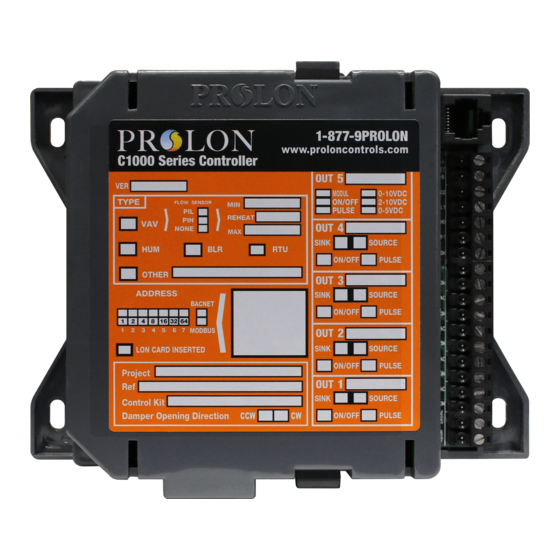
Prolon C1000 Series Hardware Manual
Chiller controller
Hide thumbs
Also See for C1000 Series:
- Hardware manual (23 pages) ,
- Quick start manual (10 pages) ,
- Operational manual (19 pages)
Summary of Contents for Prolon C1000 Series
- Page 1 HARDWARE GUIDE Chiller Controller C1000 Series Specifications and Operational Guide www.proloncontrols.com | info@proloncontrols.com 17 510, rue Charles, Suite 100, Mirabel, QC, J7J 1X9 REV. 7.3.1 PL-HRDW-CHL-C1000-C/F-EN...
-
Page 2: Table Of Contents
Table of Contents General Information ..............................4 PL-C1000 Chiller Controller ..................................4 Description ........................................4 General Behaviour ....................................4 Operating Sequence ..............................5 Pumps ...........................................5 Water Supply Setpoint ....................................5 Chiller Stages ......................................5 Components ................................6 Component Identification..................................6 LEDs ..........................................7 Address Configuration for Networking .............................7 Input and Output Identification ................................8 Inputs .................................. - Page 3 Table of Figures Figure 1 - Component Identification ................................6 Figure 2 - LEDs Identification ..................................7 Figure 3 - Addressing Dipswitches ................................7 Figure 4 - Input and Output Identification ..............................8 Figure 5 - RJ45 Pinout ....................................8 Figure 6 - Connecting the Temperature Sensors ..........................9 Figure 7 - Connnecting the Proof of Pump Contacts to the Controller ..................9 Figure 8 - Output in SOURCE mode ................................10 Figure 9 - Output in SINK mode ................................11...
-
Page 4: General Information
The various programming options allow the user to incorporate lead-lag sequences into the pumps and chiller stages, specify conditions for pump activity as well as apply schedules and limits. All these parameters can be accessed and modified using the Prolon Focus software. REV. 7.3.1 / PL-HRDW-CHL-C1000-C/F-EN... -
Page 5: Operating Sequence
Operating Sequence Pumps The PL-C1000 Chiller Controller can control systems with one or two pumps. The dual pump sequence is intended for hydronic systems where there is a secondary pump that acts as a backup to the primary pump, with both pumps being installed in parallel. -
Page 6: Components
Components Component Identification BIAS TERM BIAS TERM Figure 1 - Component Identification Legend: A - Addressing dipswitch B - Jumpers for terminating and bias resistors for the NET port (see J) C - Jumpers for terminating and bias resistors for the INT port (see K) D - SOURCE/SINK dipswitch for Output 4 E - SOURCE/SINK dipswitch for Output 3 F - SOURCE/SINK dipswitch for Output 2... -
Page 7: Leds
The example on Figure 3 shows the switches 1, 2 and 4 on the ON position. So the corresponding values are 1, 2 and 8, giving an address sum of 11. (1+2+8=11) The Prolon network allows a maximum of 127 addresses, therefore 127 controllers. Figure 3 - Addressing Dipswitches... -
Page 8: Input And Output Identification
The C1000 Chiller Controller has two separate communication ports offering the same functionality on each. Both act as ports for incoming Modbus communications from other Prolon devices or interfaces, such as a Network Controller or remote computer with Prolon Focus software. -
Page 9: Inputs
Inputs Temperature Sensors The C1000 Chiller Controller has three analog inputs to monitor various temperature readings, including supply water, return water and entering condenser water (ECWT) or outside air temperature (OAT), whether the chiller is water cooled or air cooled. The sensors used are standard 10k type 3 thermistors that share a single common connection (see Figure 6). Note that the outside air temperature can be provided by an alternate source on the network. -
Page 10: Outputs
The C1000 Chiller controller contains 5 customizable outputs; four triac ON/OFF outputs (24VAC) and one analog output (0-10VDC). Output configuration is performed via the Prolon Focus software. An integrated resettable fuse protects each of the outputs of the C1000 against current surges and short circuits. -
Page 11: Typical Connection Of Digital Outputs
2) Switch position to obtain a SINK passive output: Switch for Output 4 Isolated dry contact (On/O ) Figure 9 - Output in SINK mode Typical Connection of Digital Outputs Two types of configurations are possible: 1) Active output (SOURCE). The C1000 is actively powering the load: External Load Figure 10 - Connection of Active Outputs 3 and 4 2) Passive output (SINK). -
Page 12: Typical Connection Of The Analog Output
Typical Connection of the Analog Output Two types of configuration are possible: 1) The C1000 powers the load and provides a control signal: 24 VAC power (From terminal block #2 of the controller) Controlled 0-10v 0-10v Load Figure 12 - Connecting the Analog Output (Controller Powered) 2) The C1000 only provides the control signal to the load, which is powered by an external source: External 24 VAC... -
Page 13: Power Source / Network
Power Source The Prolon C1000 controller is powered by a 24 VAC power source connected using the "COM" terminal and the "24 VAC" terminal (see Figure 14). The common for all inputs and outputs are the same as the power source’s common (exception: when an output is set to passive, the common for this output will not correspond to the power source common). -
Page 14: Technical Specifications
Certification: UL916 Energy Management Equipment, CAN/CSA-C22.2, RoHS, FCC part 15: 2012 class B The performance specifications are nominal and conform to acceptable industry standards. Prolon Inc. will not be liable for damages resulting from misapplication or misuse of its products. -
Page 15: Compliance
Caution: Any changes or modifications not approved by Prolon can void the user’s authority to operate the equipment. Note: This equipment has been tested and found to comply with the limits for a Class B digital device, pursuant to part 15 of the FCC Rules. -
Page 16: Overall Dimensions
No part of this document may be photocopied or reproduced by any means, or translated to another language without prior written consent of Prolon. All specifications are nominal and may change as design improvements are introduced. Prolon shall not be liable for damages resulting from misapplication or misuse of its products.
















Need help?
Do you have a question about the C1000 Series and is the answer not in the manual?
Questions and answers